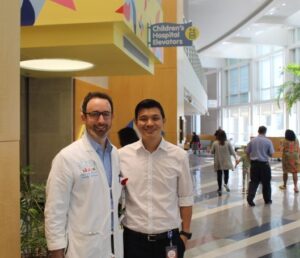
The global exchange of knowledge between practicing healthcare providers ensures that regions with the greatest need can have access to training and education essential to providing effective health services. These exchanges also form student mentor bonds, and the experiences can bring life changing perspectives.
Dr. Jimba Jatsho is one of the first two pediatricians to be trained in pediatrics, from the first postgraduate university of medical sciences in Bhutan. With a population of 700,000, the country is still developing and health care resources are limited, with 13 pediatricians overall and very few pediatric subspecialties.
Jatsho recently joined Dr. Dorey Glenn at the UNC Kidney Center for a three-week observation in pediatric nephrology as a Wyss Scholarship recipient with Health Volunteers Overseas (HVO). He is the first pediatrician from Bhutan to visit UNC for a nephrology observership.
“Dr. Jatsho gained new knowledge in pediatric nephrology at UNC, and was exposed to a different way of approaching patient care. I think he gained an appreciation for a different health care system and how it operates, which is one reason why bilateral exchanges are important,” said Glenn, clinical instructor in the division of nephrology who serves on HVO’s pediatric steering committee, and co-chair of the American Society of Pediatric Nephrology’s Global Health committee.
“In a country where pediatricians do everything, the exchange helps them see the delivery of healthcare in a different way, and over time, the experience has the potential to impact the home institution. Dr. Jatsho experienced daily rounds in the PICU, NICU, and inpatient wards, observed the pediatric nephrology outpatient clinic, attended didactic sessions, and saw how we structure and organize our clinical service and interact with other clinical services.”
The two met three years ago when Glenn first came to work with pediatric physicians, residents, and staff at Jigme Dorji Wangchuck Hospital and National University of Bhutan, facilitated by HVO, a nonprofit organization that coordinates short term volunteer assignments for qualified health care providers to support their colleagues in resource-scarce countries through education, mentorship and professional development opportunities.
“Ever since that time, we’ve maintained our connections, and this eventually led to my receiving the scholarship and observation experience,” Jatsho said. “Everyone at UNC was wonderful and friendly, and although far from home, it felt like home. We hope other colleagues from Bhutan can come for observation.”
Jatsho says one of the biggest differences between Bhutan’s hospital and UNC Medical Center is how clinical care is managed, and he describes this as the science of patient management.
“We have the textbooks and practice it, but we don’t have the facilities. Coming to a tertiary center, where most of the care is available, I’ve been able to see it put into practice, day to day, which has been quite surreal for me. This experience will remain with me as we strive to have these facilities and capabilities in the future of our country.”
For a long time, Jigme Dorji Wangchuck Hospital in the capital of Thimphu didn’t offer dialysis. It now offers peritoneal dialysis, but not hemodialysis. Jatsho says this will be the next step in a country where medical research is in its infancy.
With no medical schools in Bhutan, students have to leave the country for education and training. Jatsho attended medical school in Sri Lanka, followed by four years of general pediatric training, but he says the goal is to make training sustainable as interest grows.
“We start with formal teaching sessions, interns, participation in daily rounds, and as we get more acquainted, we share more professional and personal experiences. We showed Dr. Glenn around Thimphu, we took him on hikes so that he could experience the exchange in that context. Likewise, when I came here, he wanted me to experience Chapel Hill, and North Carolina, and I never felt too far from home.”
Health Volunteers Overseas (HVO) is a non-profit that improves the availability and quality of health care through the education, training and professional development of the health workforce in resource-scarce countries.